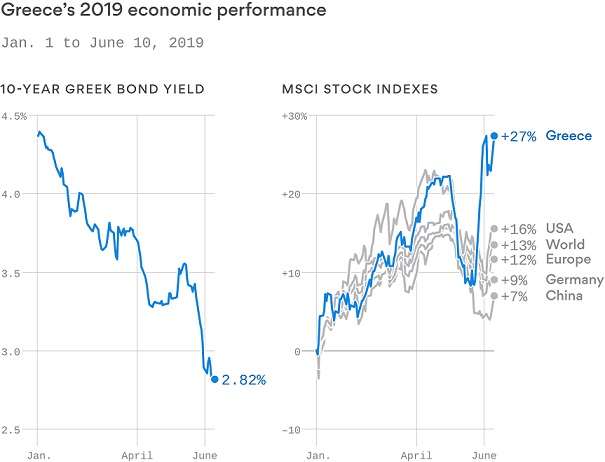
Greece’s epic 2019
Greek assets have been on fire this year, and more particularly in the past 2 weeks as investors position for a more business-friendly government to take the reins from Prime Minister Alexis Tsipras.
Why it matters: After years of being viewed as a market pariah — thrice bailed out by its eurozone creditors, limping from one austerity budget to the next — Greece last year began its road to economic recovery, with “positive developments” noted by an IMF monitor. (Though it is still the fund’s 3rd largest borrower after Argentina and Ukraine.)
Driving the news: Tsipras’ far-left Syriza party suffered massive defeats in European Parliament elections on May 26, and the government called for snap elections by June 30.
- Greece’s benchmark stock exchange has surged 38% year-to-date and an MSCI collection of its largest companies has gained 28%, outpacing every major stock index in the world, data from FactSet shows. Much of that has come in the weeks since the May 26 ballot.
The big picture: Bonds globally have performed well, but Greece has seen particularly rousing returns. Yields on 10-year notes fell to record lows after the election results and have continued to drop. (Yields fall as prices rise.)
- The yield spread between 10-year Greek government debt and its German equivalent has fallen to just 300 basis points, even with German yields at all-time lows well below 0%.
- Greece’s 5-year government bond yields earlier this month were lower than comparable Italian bonds for the first time since 2008.
“The decline since the start of the year is remarkable, with Datastream data showing that the yield dipped below 2% for the first time since the series started in 1997,” analysts at Fathom Consulting note.
- It’s all the more impressive given that Greece issued a 10-year bond with a yield of around 3.9% in March.
- GDP has returned to growth, rising an estimated 2.1% in 2018 with an IMF forecast of 2.4% in 2019 after years of declines.
Yes, but: Greece’s economic numbers have not been spectacular all around. Its current account deficit rose significantly in March and its unemployment rate remains an elevated 18% — well below the 28.4% record high reported in February 2014, but still almost double 2009 levels of 9.7%.
• A Greek fortune
What’s next? The initial market move following the European Parliamentary elections was impressive, but Greek assets have managed to maintain their bid for all of June. The stock performance is particularly impressive given a massive selloff in April and May ahead of the elections.
- “The market will now cheer a clear [center-right] New Democracy win, hoping that a new administration will tilt the fiscal mix towards a more growth-friendly manner, and be much better at attracting investment, including much-needed foreign direct investment,” Thanassis Drogossis, head of equities at Athens-based Pantelakis Securities wrote in a note to clients, according to Bloomberg.
Πηγή: axios.com





